 For
the estimated 8 to 10 percent of U of C undergrads in a fraternitiy or sorority,
membership has its ambiguities.
For
the estimated 8 to 10 percent of U of C undergrads in a fraternitiy or sorority,
membership has its ambiguities.
It's
just past five on a gloriously warm spring afternoon, and I'm hanging out
in the former dining room of the Alpha Delta Phi fraternity house, along with
U of C President Don M. Randel; Max Grinnell, AB'98, AM'02; and about 20 brothers
who have come to hear their guests talk about community relations. The stone-floored
room is grandly mock-medieval, with a timbered ceiling, chandeliers, a fireplace
deep enough for an inglenook, and tall windows draped in red velvet.
Not
only am I the sole woman (as Grinnell's guest, I've been allowed to attend this
private event), but I am also noticeably underdressed. All the brothers wear ties,
many with suits or jackets, though a few rough edges crop up: white sweat socks
worn with dress shoes, bare toes in Birkenstock sandals.
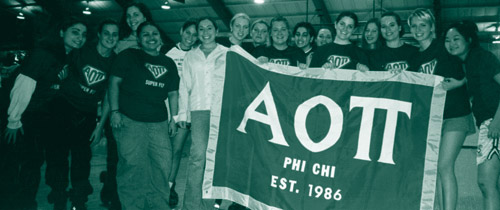
Grinnell,
author of Hyde Park, Illinois (2001), is often asked to lecture on neighborhood
history, but this invitation has an added sweetness. As a first-year in fall 1994,
he had pledged Alpha Delt but was thrown out near the end of the quarter-long
initiation-a process that until then had involved "a lot of drinking. You
have to wear a silly hat. Nothing too terrible." Then Grinnell was ordered
to clean the bathroom after a party. "There were six rancid toilets. No vomit-there
was some vomit on the dance floor, but that wasn't my area-they just smelled like
dank urine. I thought, if we're all supposed to be brothers, why does a pledge
have to do it?"
That's all forgotten now.
First Grinnell, who sports a dapper U of C tie for the occasion, then Randel talk
about the complicated relationship between neighborhood and University, as the
brothers listen attentively. It's Randel's first visit to a U of C fraternity
house-his first invitation, in fact.
After the
lectures, fourth-year Nandan Desai, Alpha Delt's president, presents a bottle
of red wine to Grinnell and a 1929 U of C songbook to Randel. "I am deeply
moved," the president responds, then asks if anyone can sing the "Alma
Mater." No one can.
During the question-and-answer
period, a question is posed to Randel: what should the role of fraternities be
in relation to the outside community?
The mood
darkens. "I don't need to tell you that fraternities have a bad reputation
in general in the country at the moment," Randel says. "They are seen
to be the locus of alcohol abuse and other bad behavior. And even if all of that
is exaggerated, perception is something that one has to cope with.
"Alcohol
abuse is certainly not the sole property of fraternities by any means," the
president continues. "But I would say, try to work at shedding that image.
Try to get your name in the paper for volunteer work, for being the place that
has the most interesting faculty members coming to talk. And then you have to
try to keep the front porch cleaned up."
Despite
the fatherly tone, Randel's speech is blunt. The brothers seem receptive-contrite
even. After one more question, the group spills out onto the not-terribly-messy
porch, which presumably had been scrubbed up for the occasion. A group photograph
is taken, then Randel cheerily departs.
"So
where's the Jägermeister?" Grinnell wants to know.
Someone
obligingly fetches a bottle from the basement, and we have two rounds of shots.
I've never drunk Jägermeister before. It is thick and black and tastes like
licorice. It's not half bad.
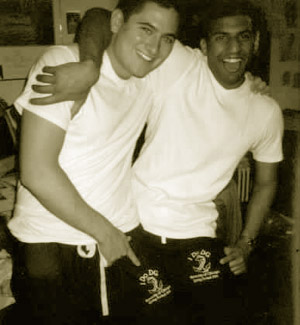 Alpha
Delt, located on University Avenue next to the Seminary Co-op Bookstore
and across from Eckhart Hall, is probably the campus's most visible fraternity.
On warm afternoons the house's wide stone patio is filled with fraternity brothers
relaxing on lawn chairs, tossing a football around, having what appears to be
an enviable amount of fun. Alpha Delt's penchant for playing loud music, even
during finals week, has not, however, won the group many friends in the math department.
Alpha
Delt, located on University Avenue next to the Seminary Co-op Bookstore
and across from Eckhart Hall, is probably the campus's most visible fraternity.
On warm afternoons the house's wide stone patio is filled with fraternity brothers
relaxing on lawn chairs, tossing a football around, having what appears to be
an enviable amount of fun. Alpha Delt's penchant for playing loud music, even
during finals week, has not, however, won the group many friends in the math department.
When
I was in the College from 1988 to 1991, Greek organizations (both sororities and
fraternities) were marginal to undergraduate life, and I assumed it had always
been that way. But yearbooks from the University's first three decades prove me
wrong. In 1895 the three-year-old U of C had five fraternities. By 1910 there
were 17 undergraduate fraternity houses bordering the campus-including four south
of the Midway. Fraternities weren't only for undergrads; there were also five
medical fraternities, three for law, one for graduate students, and one for debate.
Greek
life peaked in the late 1920s. By 1928 there were 33 fraternities and 12 women's
"social clubs"-similar to sororities but unaffiliated with national
organizations. Most had Greek-letter names, while others were quirky, like the
Esoteric Club or the Quadranglers. Each fraternity and women's club "had
its place in a carefully graded pecking order of prestige," historian William
H. McNeill, AB'38, AM'39, wrote in his 1991 memoir, Hutchins' University.
The 1929 freshman guide to student activities
devoted several pages to rushing and pledging rules. For fraternities the formal
two-week rush period began during Freshman Week, though men could also join in
winter or spring; even high-school seniors in their last semester could pledge.
Women's clubs began the process at spring quarter's end and continued through
Freshman Week, with chosen members pledging before school opened. Both fraternities
and women's clubs "make all advances," the rules stated firmly. "After
a period of rushing, the student is either extended a bid or dropped."
During
World War II women's clubs thrived while fraternity life understandably stalled.
Of the 14 fraternities still listed in the 1945 student handbook, five had "no
house for the duration" while six were "inactive for the duration."
By the mid-1950s just nine fraternities and four women's clubs remained. The 1957
yearbook, Cap & Gown, predicted that Greek organizations would resurge
in the next decade, though "the days when thirty-plus fraternities pledged
eighty percent of a freshman class" were not expected to return.
In
the 1960s and 1970s Greek organizations attempted to move with the times, becoming
more political (at the height of the Cuban missile crisis, the Interfraternity
Council invited a former Cuban ambassador to speak) and less exclusive (the local
chapters of both Alpha Delt and Delta Upsilon went coed). The administration seemed
to encourage fraternity life; according to the 1963 Cap & Gown, "The
policy of the university has always been favorable to the fraternity system, and
in attempting to expand the system, the administration has offered to construct
a Fraternity Quadrangle...no definite decisions have been made as yet." The
quad never came to pass, and by the late 1970s Greek organizations were not even
listed with other campus social groups but were lumped in with housing.
Back
in 1929-when Greek organizations appeared in the yearbook's "secret societies"
section-Alpha Delt claimed 35 student members, including four graduate students,
and 11 professors. By 1955 there were 27 members; by 1977 there were 15, including
five women.
Beginning in the early 1980s, however,
the Greek system made a slow resurgence-so slow I completely missed it as an undergrad.
In 1983 Phi Kappa Psi became the first new fraternity on campus in 60 years. Two
years later the U of C had its first national sorority, Alpha Omicron Pi, followed
in 1986 by a second sorority, Kappa Alpha Theta. A third, Delta Gamma, established
a U of C chapter in 2001. For the guys, there are now ten fraternities, including
Alpha Delt and Delta Upsilon, which are once again all male. The semi-Greek organization
Alpha Phi Omega, a coed service fraternity, also was reestablished at the University
in 1997.
Because the administration does not officially
recognize Greek organizations, exact membership numbers aren't available. Single
sex and with selective membership, fraternities and sororities can't be considered
registered student organizations (RSO); instead they fall into the category of
"community organizations." Lori Hurvitz, assistant director of student
activities, estimates that between 8 and 10 percent of undergraduates belong to
a fraternity or a sorority-a percentage comparable to that at the University of
Michigan. While the number pales in comparison to institutions like the University
of Florida, where 70 percent of students are in fraternities or sororities, "it's
a decent-size Greek system," says Hurvitz, who serves as Greek liaison. "The
reality is, a lot of our students are involved."
Perhaps
the most telling sign of the Greek resurgence is that this academic year the administration
will stop pretending the groups don't exist. Greek organizations still won't be
RSOs, but they will be granted certain privileges: recruitment support, the chance
to apply for storage and office space in the Reynolds Club or Ida Noyes. In exchange
Hurvitz hopes to get names and contact information for each group's leaders, a
commitment that leaders will attend the University's alcohol-awareness sessions,
and advance warning of large parties.
For some
the policy change doesn't go far enough. Withholding the RSO title, complains
second-year Oscar Fernandez, president of Sigma Phi Epsilon, indicates that fraternities
and sororities are still "excess baggage." Kappa Alpha Theta, says fourth-year
Megan Driscoll, isn't even supposed to have chapters at schools that don't recognize
the Greek system, but because the national sorority's focus is scholarship, an
exception was made for Chicago. "It's a shame the administration doesn't
understand what a great machine they have for building up a sense of community,"
Driscoll says.
But other Greeks prefer the current
hands-off relationship. Alpha Delt's Desai is typical: if the increased oversight
is intended "as a restrictive measure, there are several problems I have
with it," he says. "I don't see why it's necessary."
No
matter what their status, Greek organizations certainly play a larger role in
undergraduate social life. According to Desai, open parties at the house attract
up to 500 people-more than 10 percent of the undergraduate student body. Greek
charity events have an increasingly high profile, with the sorority Kappa Alpha
Theta's Mr. University pageant the most obvious example. "Greek organizations
provide a social outlet," says Hurvitz, "not only for their members,
but for the rest of the community as well."
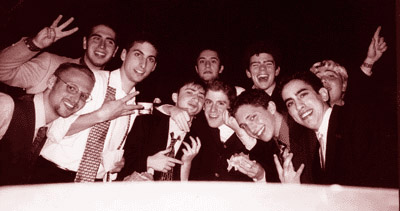 I
actually made fun of one of my friends for joining a sorority," confesses
Driscoll of Kappa Alpha Theta. We're sitting in Hutchinson Commons on a bright
February day, and Driscoll must shade her eyes to look my direction, like a suspect
facing the spotlight during a police interrogation. "I've always had a bad
feeling about sororities. But I was friends with all these boys, and I found it
really hard to meet nice girls until I joined Theta."
I
actually made fun of one of my friends for joining a sorority," confesses
Driscoll of Kappa Alpha Theta. We're sitting in Hutchinson Commons on a bright
February day, and Driscoll must shade her eyes to look my direction, like a suspect
facing the spotlight during a police interrogation. "I've always had a bad
feeling about sororities. But I was friends with all these boys, and I found it
really hard to meet nice girls until I joined Theta."
"One
of the reasons I came here is because it wasn't a very big Greek place,"
adds third-year Kate Grady, another Theta, sitting out of the glare. "I never
thought it would be anything I'd want to do."
It's
a recurring theme: the reluctant Greek member, vaguely surprised and embarrassed
by-and yet proud of-being in a fraternity or sorority. At a school where being
Greek is not a mark of status and belonging but its polar opposite, the ambivalence
is understandable.
"Joining a sorority here
would obviously not be the normal, popular thing to do," says Grady, "so
for that reason it attracts people who wouldn't be in a sorority at other places."
Third-year Emilee Lales of Delta Gamma perhaps
best personifies the cross between the sorority-girl and the U of C library-dork
stereotypes. Her career goal is to become a wedding planner, so she is concentrating
in human development: "I want to understand the family, the role of marriage
in our society, getting married earlier or later in life, the rising divorce rate,"
she says.
According to Desai, fraternities are
equally anomalous. "At other schools, you have formalized rush processes,
strong rivalries between Greek organizations, people who don't have friends outside
their chapters," he says. "All those rules don't apply to this school."
Some non-Greek students might think that "frats and sororities are made up
of the stereotypical beer-chugging, 'need to buy my friends' boneheads,"
says Fernandez of Sigma Phi Epsilon, but in fact "things are much different
here, because none of us are boneheads."
Nationally,
however, Greek stereotypes are alive and well, says Driscoll. "When I went
to the national convention, I did meet a lot of girls who fit the mold-blond and
engaged. At other places, it's a lot more superficial. Even our rush is not as
superficial. We hate rush," she says, as Grady nods vehemently. "We
wish we didn't have to do it," but the national organizations require it.
Sorority rush at the U of C involves programmed events such as short, dry parties
and "skit night," while fraternity recruitment happens informally at
open parties. "We just gauge people's interest by how much they talk to brothers,"
says Desai.
Fraternities and sororities are by
nature exclusive, says Greek liaison Hurvitz, but Chicago students who want to
join a Greek organization are very likely to succeed. While women might not make
their first choice, their second or third choice will almost certainly accept
them; for men, joining a Greek organization is a lot like joining any other set
of friends. "There's probably one person every year who falls through the
cracks. Maybe one," Hurvitz says, "whereas some registered student organizations
are really elitist-you really have to struggle your way in."
Most
Greeks deny that their group attracts a certain type of person, but prejudices
and rumors abound: "Everyone knows who's the party frat, the philanthropic
sorority, et cetera," says Sig Ep's Fernandez. Alpha Omicron Pi women are
supposed to be particularly pretty (though some students say that distinction
goes to Kappa Alpha Theta), while Delta Gammas are nice; Phi Gamma Delta attracts
football players and other jocks, Phi Delta Theta brothers are preppy, Sigma Phi
Epsilon brothers are serious and conservative.
Conservative
or not, Sig Ep is also widely known for two things that are actually true: it's
dry and antihazing. "My decision to join rested heavily" on those characterisitcs,
says Fernandez, as well as the fact that pledges have "all the same rights
and privileges as any other member, regardless of how long they've been in the
fraternity." Had Grinnell opted for Sig Ep, he might still be a fraternity
brother today-or at least he wouldn't have been kicked out for refusing to scrub
filthy toilets.
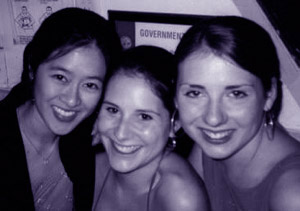 At
ten o' clock on a Saturday morning late in spring quarter-a time when many
overworked (or overpartied) undergrads sleep in-I meet up with seven Alpha Phi
Omega volunteers at Breakfast for the Hungry, held monthly at the United Church
of Hyde Park, 53rd and Blackstone. Rows of folding tables fill the high-ceilinged
room, which has stained-glass windows and a stunning wooden balcony curving along
two walls. About 100 people-some families, but mostly middle-aged men-eat pancakes,
eggs, and sausages off Styrofoam plates. "I really like sitting down and
talking with the people," says fourth-year Ellie Goldberg, the group's president.
"They're so nice. Their outlook on life is so positive."
At
ten o' clock on a Saturday morning late in spring quarter-a time when many
overworked (or overpartied) undergrads sleep in-I meet up with seven Alpha Phi
Omega volunteers at Breakfast for the Hungry, held monthly at the United Church
of Hyde Park, 53rd and Blackstone. Rows of folding tables fill the high-ceilinged
room, which has stained-glass windows and a stunning wooden balcony curving along
two walls. About 100 people-some families, but mostly middle-aged men-eat pancakes,
eggs, and sausages off Styrofoam plates. "I really like sitting down and
talking with the people," says fourth-year Ellie Goldberg, the group's president.
"They're so nice. Their outlook on life is so positive."
Alpha
Phi Omega, a coeducational fraternity, focuses on service; members must perform
25 service hours per quarter. APO is and isn't a Greek organization: "A lot
of people don't even know what we are or confuse us with AOII," says Goldberg.
True, APO has a Greek name and charges dues ($15-25 a year, compared to about
$500 for the others), and its members sometimes participate in Greek charity fund-raisers.
But the group doesn't demand exclusivity (one member also belongs to sorority
Delta Gamma, another to fraternity Delta Kappa Epsilon), and its service events
are open to anyone.
At sororities a specific "service
requirement" outlines members' philanthropic responsibilities. Second-year
Rina Martinez joined Alpha Omicron Pi primarily to do community service. "It's
so easy to take part in philanthropy all the time," she says. Sororities
usually support specific groups or causes chosen by the national office. At AOII
it's arthritis research, at Kappa Alpha Theta it's Court Appointed Special Advocates,
at Delta Gamma it's blindness and vision care.
Fourth-year
Bethany Ruedel, who coordinates Delta Gamma's service efforts, takes the group's
philanthropic mission and its motto, "Do good," particularly seriously.
While the Chicago chapter is just a year old, under Ruedel it has already established
a regular vision-screening program-adapting tests developed by Prevent Blindness
America-at the Children's Museum on Navy Pier.
Delta
Gamma's screening program uses shapes rather than letters, so children don't have
to speak English to take the test. Among the group's members are Korean, Chinese,
Russian, French, and Spanish speakers who can understand, or at least guess at,
a child's answers. Delta Gamma has done vision screening at three Hyde Park locations
and plans more events.
The screening program,
as well as fund-raising efforts for the blind, won Ruedel a Women of Vision Award
from Prevent Blindness America and LensCrafters. Five Chicagoans were recognized
in 2002-all medical professionals except Ruedel.
"We
don't advertise that we do two service events a quarter," says Kappa Alpha
Theta's Driscoll, co-organizer of the outwardly silly Mr. University pageant,
which this year raised $4,000 for Court Appointed Special Advocates. "But
that's a large part of what Greek organizations are about."
At
the very end of spring quarter I return to Alpha Delt for Senior Breakfast,
a 24-hour party for graduating seniors, free to the entire College. Downstairs,
where Nirvana's Nevermind is blasting, it's much too noisy to interview
Desai. "Do you mind coming up to my room?" he asks politely.
I
try not to blanch: I am 32 years old, married for eight years, and I have just
been invited up to a frat boy's room for the first time ever. The room smells
of something rank but unidentifiable. It also contains another guy, who sits quietly
crafting a project out of posterboard, paying us no attention.
"A
lot of people don't really realize the advantages of being Greek," says Desai.
"It teaches you how to be a more balanced person. There's a social aspect
combined with a literary environment, in this house especially."
A
literary environment? "Alpha Delt was actually founded as a literary
society," he says earnestly. The group regularly sponsors "literary
events," he explains, such as the talk by Grinnell and Randel. Speakers have
included economics lecturer Allen Sanderson and David Faxon, the U of C Hospitals'
cardiology chief.
Brothers also read their own
writing at weekly chapter meetings; Desai recently read an article he wrote while
interning at an environmental magazine. "Our ability to gather in the library
on Mondays and talk about whatever we want to talk about is something that's-"
he pauses, "-sacred might be pushing it, but it's definitely very
important to everyone in the house."
Alpha
Delt's calendar is crammed with purely social events-Wednesday night study breaks,
open parties three or four times a quarter, formals, poker nights-but not with
community service. "I'll be the first to admit it hasn't been enough,"
Desai says, but President Randel's comments "definitely made an impact on
people in the house. I think everyone's realizing slowly-maybe as a result of
the rude shock of having Don Randel say those words to us-that it's good to get
involved."
Mark Papa, AB'89, an Alpha Delt
alumni board member who regularly attends the fraternity's events, was particularly
struck by Randel's lecture. As the board's vice president of philanthropic affairs,
Papa is working with Chris Gross, a first-year who volunteered to motivate the
Alpha Delts. Beginning in fall 2002, "I have asked our undergraduates as
a group to commit to 100 hours of community service per quarter," Papa says-about
three hours per person, comparable to many sororities' requirements.
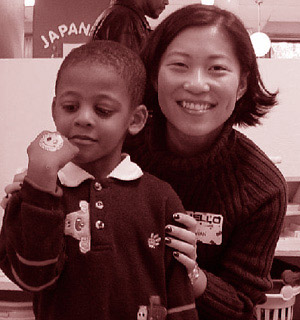 In
a way, the growth of sororities and fraternities is typically U of C, in
that it runs completely contrary to national trends. Every year more colleges
and universities across the country lose patience with the problems of the Greek
system: drinking, hazing, antiacademic attitudes. New York's Alfred University
and Maine's Bowdoin and Colby Colleges have eliminated the Greek system, while
Dartmouth College has imposed strict rules about alcohol and service.
In
a way, the growth of sororities and fraternities is typically U of C, in
that it runs completely contrary to national trends. Every year more colleges
and universities across the country lose patience with the problems of the Greek
system: drinking, hazing, antiacademic attitudes. New York's Alfred University
and Maine's Bowdoin and Colby Colleges have eliminated the Greek system, while
Dartmouth College has imposed strict rules about alcohol and service.
Even
during the heyday of fraternities at Chicago-when the fraternity pages in Cap
& Gown listed professors as well as students-the groups came in for criticism.
"We realize that fraternities are not always an asset to our collegiate institution,
but often a very difficult and baffling problem," the Alpha Delts wrote when
inviting newly appointed president Robert Maynard Hutchins to speak at their house
in 1929. "It is our belief that they can be made constructive social and
educational units in the university community."
In
the first of several Alpha Delt talks, Hutchins said that fraternities play an
important role in higher education. And, contends Harry Ashmore in Unseasonable
Truths (1989), Hutchins was not being sarcastic when he remarked of fraternities:
"Upon them must depend the development and maintenance of a wholesome, virile
social life."
While Hutchins "ridiculed
the rah-rah aspects of undergraduate life," writes Ashmore, "he made
ritual appearances at traditional student events." On at least one occasion,
Hutchins marched arm-in-arm with the Alpha Delts to Hutchinson Court, where he
attended the Interfraternity Sing and the awarding of "C" blankets.
That
would seem unlikely behavior for the man considered the architect of Chicago's
emphasis on undergraduate academics-to the neglect of a social life and everything
else. Or perhaps not, considering that Hutchins, while a student at Yale, pledged
Alpha Delt.
In my own undergraduate days I knew
several students who idolized Hutchins but only one member of a Greek organization:
my calculus T.A., a Nebraska woman with blowsy white-blond hair, who sometimes
wore a sorority T-shirt (which sorority, I don't recall). While some members of
the class mixed up the proofs' Greek letters, she knew them all. It wasn't her
math major that taught her, she explained one day, but those nights when she and
her sisters had to recite the Greek alphabet after downing a required quantity
of beer. The class reacted to this anecdote with both puzzlement and outright
derision.
Thankfully, I am much less judgmental
now. Nonetheless, in several of my discussions with today's young Greek Chicagoans,
I couldn't shake a nagging, freaked-out feeling-especially with the sorority sisters.
No matter how friendly they were, I felt as if we were shouting at each other
across a canyon of difference and misunderstanding.
During
the interviews I kept imagining that, if I could wish myself young again and rush
a sorority (rather than deejay on WHPK and draw comics, as I actually did as an
undergrad), I wouldn't be pretty enough or nice enough to cut it. I would be the
one person, as Lori Hurvitz put it, who fell through the cracks.
The
human need for belonging is powerful and at the same time terrifying: how can
you be part of a cohesive group unless some people are closed out of it? In the
end, I'm back to that spring afternoon at Alpha Delt. The issue, for Greeks and
non-Greeks, it seems, is still community relations.
Carrie
Golus, AB'91, AM'93, is a freelance writer in Chicago and at work on a novel.
The photo illustrations on these pages are based on images posted on the Web sites
of several Chicago fraternities and sororities.


![]() Contact
Contact
![]() About
the Magazine
About
the Magazine ![]() Alumni
Gateway
Alumni
Gateway ![]() Alumni
Directory
Alumni
Directory ![]() UChicago
UChicago![]() ©2002 The University
of Chicago® Magazine
©2002 The University
of Chicago® Magazine ![]() 5801 South Ellis Ave., Chicago, IL 60637
5801 South Ellis Ave., Chicago, IL 60637![]() fax: 773/702-0495
fax: 773/702-0495 ![]() uchicago-magazine@uchicago.edu
uchicago-magazine@uchicago.edu For
the estimated 8 to 10 percent of U of C undergrads in a fraternitiy or sorority,
membership has its ambiguities.
For
the estimated 8 to 10 percent of U of C undergrads in a fraternitiy or sorority,
membership has its ambiguities.



